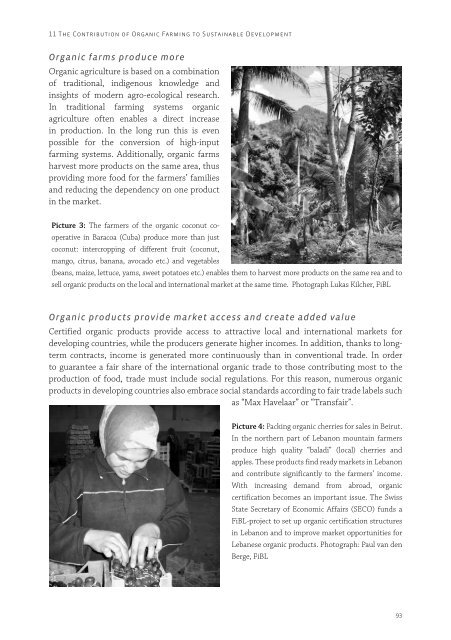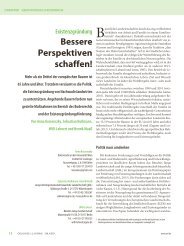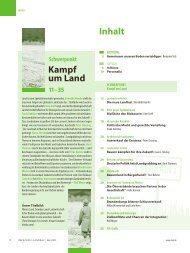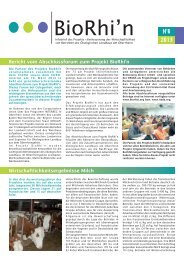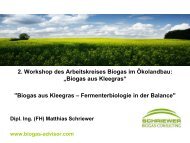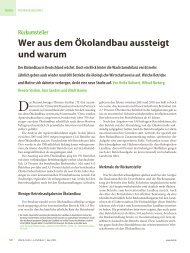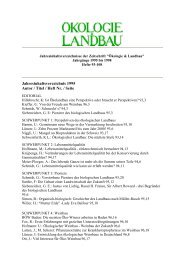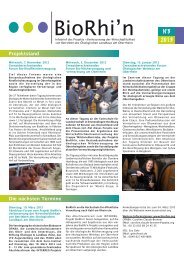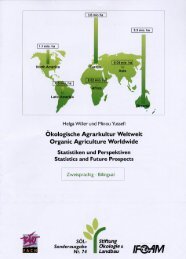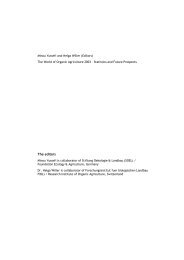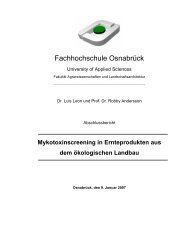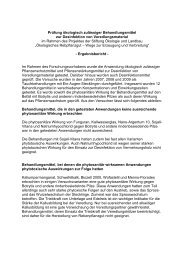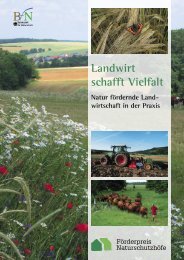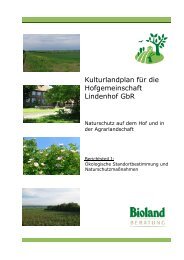the world of organic agriculture - Organic Eprints
the world of organic agriculture - Organic Eprints
the world of organic agriculture - Organic Eprints
You also want an ePaper? Increase the reach of your titles
YUMPU automatically turns print PDFs into web optimized ePapers that Google loves.
11 The Contribution <strong>of</strong> <strong>Organic</strong> Farming to Sustainable Development<br />
<strong>Organic</strong> farms produce more<br />
<strong>Organic</strong> <strong>agriculture</strong> is based on a combination<br />
<strong>of</strong> traditional, indigenous knowledge and<br />
insights <strong>of</strong> modern agro-ecological research.<br />
In traditional farming systems <strong>organic</strong><br />
<strong>agriculture</strong> <strong>of</strong>ten enables a direct increase<br />
in production. In <strong>the</strong> long run this is even<br />
possible for <strong>the</strong> conversion <strong>of</strong> high-input<br />
farming systems. Additionally, <strong>organic</strong> farms<br />
harvest more products on <strong>the</strong> same area, thus<br />
providing more food for <strong>the</strong> farmers’ families<br />
and reducing <strong>the</strong> dependency on one product<br />
in <strong>the</strong> market.<br />
Picture 3: The farmers <strong>of</strong> <strong>the</strong> <strong>organic</strong> coconut cooperative<br />
in Baracoa (Cuba) produce more than just<br />
coconut: intercropping <strong>of</strong> different fruit (coconut,<br />
mango, citrus, banana, avocado etc.) and vegetables<br />
(beans, maize, lettuce, yams, sweet potatoes etc.) enables <strong>the</strong>m to harvest more products on <strong>the</strong> same rea and to<br />
sell <strong>organic</strong> products on <strong>the</strong> local and international market at <strong>the</strong> same time. Photograph Lukas Kilcher, FiBL<br />
<strong>Organic</strong> products provide market access and create added value<br />
Certified <strong>organic</strong> products provide access to attractive local and international markets for<br />
developing countries, while <strong>the</strong> producers generate higher incomes. In addition, thanks to longterm<br />
contracts, income is generated more continuously than in conventional trade. In order<br />
to guarantee a fair share <strong>of</strong> <strong>the</strong> international <strong>organic</strong> trade to those contributing most to <strong>the</strong><br />
production <strong>of</strong> food, trade must include social regulations. For this reason, numerous <strong>organic</strong><br />
products in developing countries also embrace social standards according to fair trade labels such<br />
as “Max Havelaar” or “Transfair”.<br />
Picture 4: Packing <strong>organic</strong> cherries for sales in Beirut.<br />
In <strong>the</strong> nor<strong>the</strong>rn part <strong>of</strong> Lebanon mountain farmers<br />
produce high quality “baladi” (local) cherries and<br />
apples. These products find ready markets in Lebanon<br />
and contribute significantly to <strong>the</strong> farmers’ income.<br />
With increasing demand from abroad, <strong>organic</strong><br />
certification becomes an important issue. The Swiss<br />
State Secretary <strong>of</strong> Economic Affairs (SECO) funds a<br />
FiBL-project to set up <strong>organic</strong> certification structures<br />
in Lebanon and to improve market opportunities for<br />
Lebanese <strong>organic</strong> products. Photograph: Paul van den<br />
Berge, FiBL<br />
93


